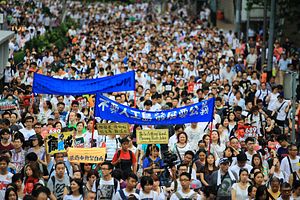Hong Kong is at a political crossroads, as the National People’s Congress (NPC) in Mainland China has proposed to allow universal suffrage in final selection of the Chief Executive, as long as a nominating committee chooses candidates approved by the Communist Party. The proposal is to be voted upon by the Legislative Council; if rejected, the 2017 will be by committee, as in the last election (of Chun-ying Leung). Mainland China’s involvement in Hong Kong’s elections has reduced the ability of Hong Kong residents to freely run for and elect a candidate of their choice for the most powerful government position of this Special Administrative Region. Does this constraint negatively or positively impact the economy?
Hong Kong’s market economy is to be maintained at least through 2047 according to the Basic Law. China and Hong Kong have strong interests in upholding their mutual economies, as Hong Kong is the largest source of inward investment for Mainland China, and also the largest recipient of foreign direct investment from the Mainland. The economies are intricately intertwined through trade and investment, so in these respects, interests are intertwined.
Nor has the movement against Beijing political involvement gained widespread popularity from an economic perspective. Hong Kong’s pro-democracy movement, Occupy Central with Love and Peace, has in fact been accused by some of putting Hong Kong’s economy at risk. Even though the movement has had little direct impact on the economy thus far, pro-Beijing groups worry that the pro-democracy movement will give rise to political instability and jeopardize the economic well-being of Hong Kong residents.
At the same time, some Hong Kong bankers are opposed to increased involvement by Mainland China in Hong Kong’s political arena. The concern is that under the Mainland’s expanded influence, Hong Kong will be used as a base to launder money, and to conduct business through cronyism rather than competition. There is fear that political influence by the Mainland will result in an economy that mirrors that on the Mainland and reduces the competitiveness of Hong Kong’s financial sector.
Mainland China’s resistance to true democratic election of Hong Kong’s chief executive has to date resulted in the appointment of unpopular figures, including Tung Chee Hwa (1997-2005) and Chun-ying Leung (2012-Present). Neither of these leaders have been viewed as successful in promoting the interests of Hong Kong’s local economy. As chief executive, Tung Chee Hwa implemented controversial infrastructure projects, including a Disney theme park and a Chinese medicine center, and overturned the relaxation of the right to abode policy, which would have allowed an increase in immigration to Hong Kong, by turning to the NPC. Leung’s much-touted economic program, which attempted to reserve select housing for Hong Kong residents, flopped after failing to reduce the cost of flats, while programs reinforcing business relations with Mainland China were pushed forward. Hence ten out of 17 years of leadership by Beijing-approved chief executives have been viewed as more pro-Beijing than pro-Hong Kong. This presents a problem to Hong Kong’s economy.
For sure, because Hong Kong’s economy is closely connected to that of Mainland China, to some extent, economic interests align. Were Hong Kong a province of Mainland China and not a Special Administrative Region that had been governed separately from the Mainland for over 150 years, there would be no issue with the Mainland’s presence in Hong Kong’s governance. This is not the case. Over the past 150 years, Hong Kong has developed its own social and business culture, as well as its own economic interests. It therefore stands to reason that the constraint that subjects the Hong Kong chief executive position to the control of Mainland China may have negative repercussions for Hong Kong’s economy.

































